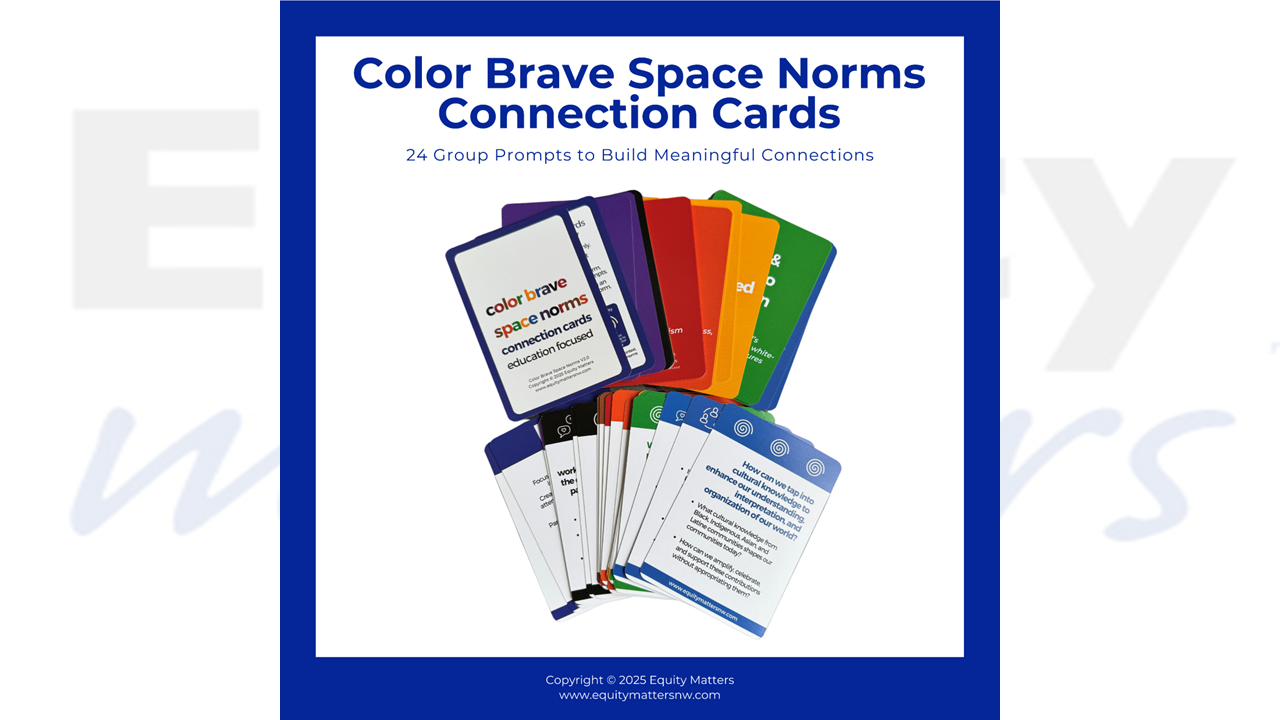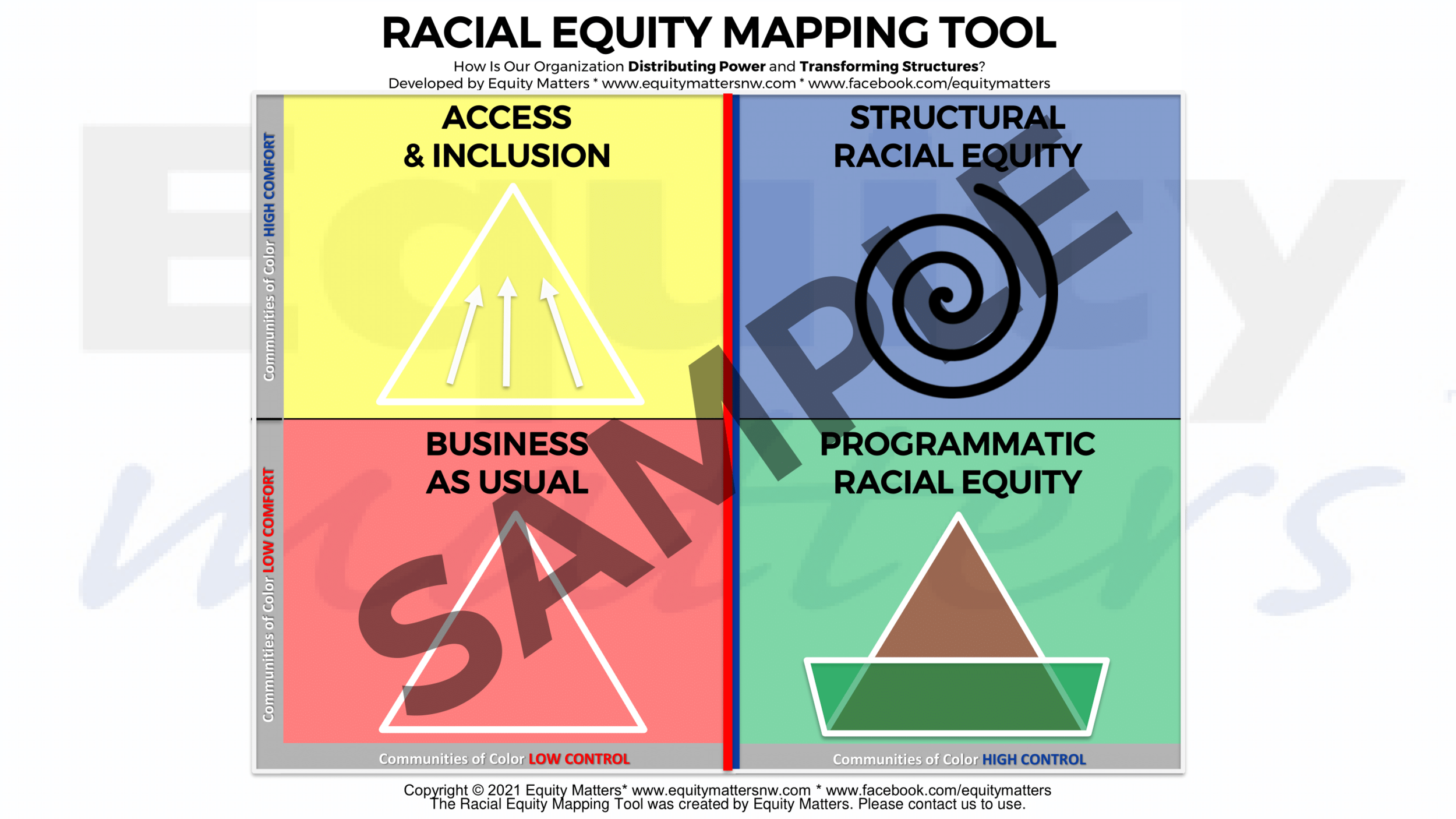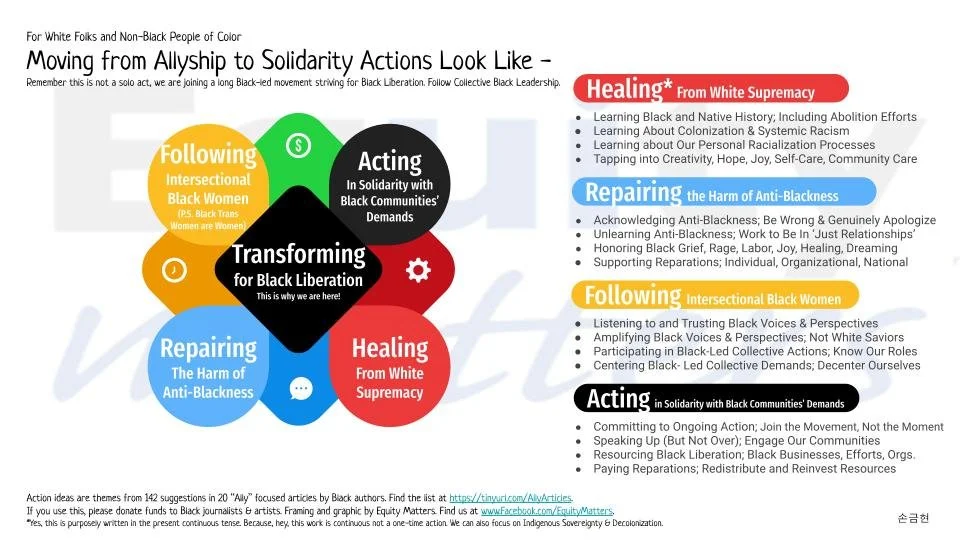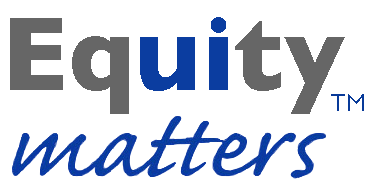Licensing
Thank you for honoring our request to license our tools.
Since 2018, Equity Matters has distributed over $80,000 of licensing profits. 100% of the funds go to POC-led and embedded organizations, with approximately 60% of funds allocated to Black or Native community-led and accountable organizations.
If you want to license any of our tools, please email licensing@equitymattersnw.com for more information. Please allow a minimum of two weeks to license a tool.
-

Connection Cards (Physical Sets)
Are you looking to build meaningful connections & advance racial equity Our Connection Cards are designed to spark deep, thoughtful conversations that foster both stronger relationships and racial equity. Each deck is thoughtfully crafted with group prompts that encourage open dialogue, reflection, and action—whether in small or large group settings.
Organizational License Includes:
✅ Physical Card Packs – Perfect for teams, workshops, and community gatherings.
✅ Companion Resource Articles – Access a curated library of supporting articles on a password-protected page to deepen engagement with each prompt.
✅ Capacity Support – Receive 2–3 hours of strategic guidance to maximize impact and integrate the cards into your work.
✅ Priority Registration for Community of Practice Opportunities – Connect with other organizations through future facilitated sessions (virtual or in-person) to share insights and best practices.We currently offer Color Brave Space Norms Connection Cards, with more racial equity-focused decks coming soon!
Start the conversation. Strengthen relationships. Foster racial equity.
-

Color Brave Space Norms
The Color Brave Space Norms are a set of meeting agreements that help to focus conversations on pushing for racial equity and justice. When used in conjunction with active facilitation, the norms can reframe conversations, allowing for more relationship-building and a deepening understanding of racial equity.
-

Racial Equity Mapping Tool
Equity has become the new buzzword. It is used so frequently it has almost come to have no meaning at all. The misuse or appropriation of the term equity is so common and so annoying it spawned the Fakequity blog site. As the term equity started gaining traction, people and organizations started calling all their diversity, engagement, and inclusion efforts equity. We call B.S. to this catch-all definition of equity. We developed this tool to help us get honest with ourselves about what we are truly doing (and not doing) to pursue equity, specifically racial equity.
Read more about the Racial Equity Mapping tool on Fakequity.
-

Moving from Allyship to Solidarity Graphic
For white Folks and Non-Black People of Color: The action ideas here are based on 20 articles specifically on “allyship.” All the articles are written by Black authors, and it appears that around 75% of the authors are Black women. We counted 142 specific action idea suggestions and noticed some clear themes emerge.
Read more about Moving from Allyship to Solidarity on Fakequity.
If you used the graphic in any way, we are asking for accountability on how you compensated Black journalists or artists. Send us an email and let us know. Let’s practice accountability (and not more extraction of Black labor).
Why We License Our Tools & Materials
-

Resource Distribution
One of our goals with our licensing is to use our power and positionality to spread our impact (beyond training). We have a lot of team discussions about the depth of our impact via training. Heidi wrote a Fakequity blog titled 'We can't train our way to racial equity' a few years ago. We believe training is a tool that white dominant society is comfortable using (and appropriating and weaponizing). And, while organizations will probably never give up on training, we know that we can use our position to push people to think about organizational racial equity work in different ways. We aren't licensing for our financial gain and end up paying forward almost all of our licensing profits. Still, we can use our ability to ask for license funds (on a sliding scale) to shift financial resources to organizations doing racial justice work that is led and embedded in communities of color. We are proud to have distributed over $80,000 in licensing profits in our community.
-

Relational Approach
We value centering a relational approach to increase impact and minimize the weaponization of our tools. We believe our materials don't stand alone. They are a part of our team forming a relationship with individuals and organizations for the greatest impact. And unfortunately, we have also seen racial harm done by weaponizing our materials in the workplace. We require people to ask for permission to use our tools so we can engage in a dialogue and be in a relationship (even if it's just in a small way). The licensing process allows people who use our materials to understand the intention and impact of using the tools. Our main hope is that our relational approach increases effectiveness and minimizes any potential racial harm done via our materials.
-

Respect for our WOC Team
We view licensing our work as a way to respect our Women of Color Team. Unfortunately and unsurprisingly, doing racial equity work, we pay a heavy tax at the intersection of racism and sexism. And one way we ask that people respect our work and our team is by not appropriating our labor.
